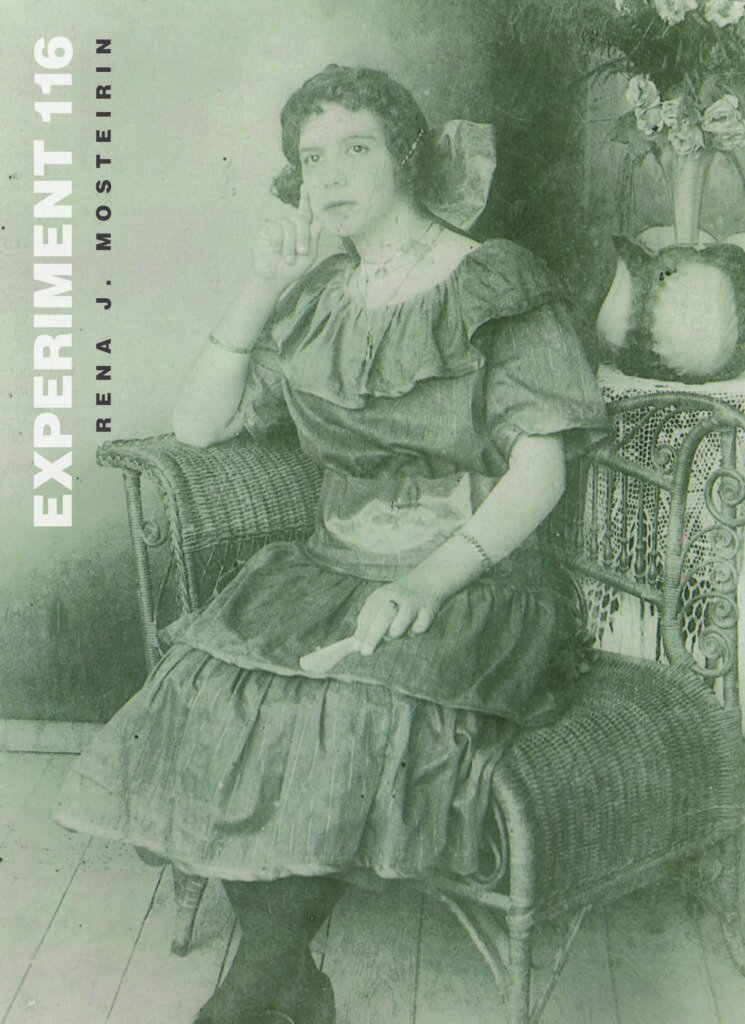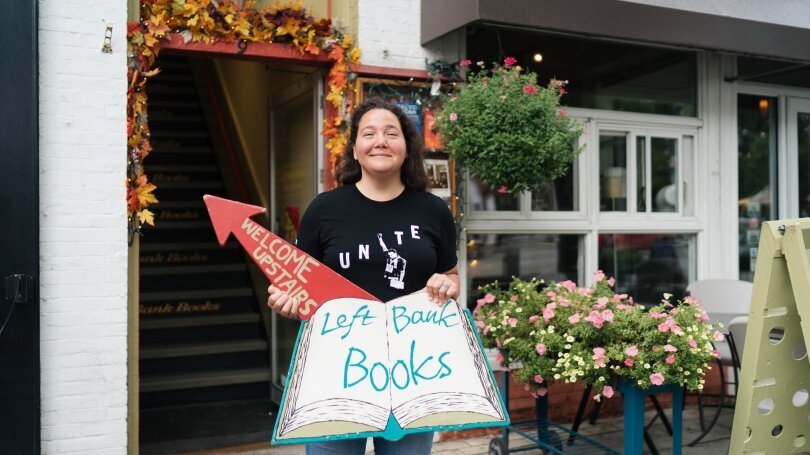One of the many delights of constraining our work to a fairly small geographical region is having the chance to watch local authors’ works over time and observe how their new work often revolves in conversation with their previous projects.
This is definitely the case with Rena J. Mosteirin, whose new book, Experiment 116 (Counterpath, October 2021), is an utterly natural extension of her previous works, where she’s found poems in texts ranging from spam emails and Moby-Dick to the Apollo 11 computer code. Although the sources and the results vary, in each the interrogation is similar: how do we find and share meaning, regardless of our native tongue, and how do these translations from source to result act “as a bridge between languages, striking unintended emotional chords and producing by way of error artistic depictions of life.”
In Experiment 116, Rena begins with Shakespeare’s Sonnet 116 and partners with Google Translate to generate new versions and visions of the original. In celebration of the publication of Experiment 116, we’re delighted to share two examples of the resulting translated poems (including one read by Rena), and our interview with Rena about her writing process, what she discovered with the project, and some of her favorite machine-translated books.
Congratulations on your new book, Rena!
→ SCOTS GAELIC → YIDDISH →
Do not let me marry real minds
Accept barriers. Love is not love
That changes when it finds change,
Or comb with the remover to remove it.
Oh no! It is an established sign forever
Which looks in temples and is never shaken;
It is the star of every wand,
It is not known who it is worth, although the height will be taken.
Fool loves no time, though with pink lips and cheeks
Inside the campus the sequence descends;
Love does not change with his short hours and weeks,
But carry it even to the brink of injury.
If this is a mistake and I’m convinced,
I never wrote, and no one ever lov’d.
Literary North: As you explain in the book, Shakespeare’s Sonnet 116 is near and dear to your heart. What moves you about Sonnet 116 and why did you choose it to be the centerpiece of your latest book, Experiment 116?
Rena Mosteirin: The officiant at my wedding read this poem as part of the ceremony. On that day the poem became embedded in the memory of my wedding. In Ang Lee’s screen adaptation of Jane Austen’s Sense and Sensibility we see Marianne Dashwood’s character obsessing over Sonnet 116. Lee adapts the novel to the screen—which can be understood as a certain kind of translation—and incorporates Sonnet 116 in the process. Kate Winslet, in her role as Marianne Dashwood, interprets the poem for us as she speaks it aloud. There are so many other places where this poem appears, but I love these two examples because we don’t just get the poem qua poem. We receive this, and other canonical poetry, as part of a scene in a movie, or a special day in our own lives. With this book, I wanted to rip the poem out of all other contexts and place it at the center of the experiment. In doing so, I invite the reader to imagine the poem as something they can play with or change, and perhaps imagine different transformative possibilities for other works of canonical literature.
LN: Did any of the translations elicit unexpected emotions or reactions in you, or change the meaning of the poem in an unexpectedly delightful way?
RM: Yes! My favorite example of this is when the line “Let me love you” popped up, which is the title of a Justin Bieber song I love. Here’s how that happened:
English: Let me not to the marriage of true minds
English → Hindi: मुझे सच्चे मन से शादी न करने दें
Hindi → Yoroba: Ma je ki n fe yin
Yoroba → English: Let me love you
This is exciting not just because I am a fan, but because Bieber and Shakespeare register so differently in our culture. Yet when you get right down to it, they’re saying the same thing. It’s useful for me to remember that, both as a writer and a reader.
LN: How did you decide which languages to use in the translations, the order/direction of the translations, and the pairs or triads of languages to use for each cycle of translation? Did you have a plan, or was there a randomizing factor?
RM: The plan was to create poems that were variations on 116, each with a different first line. No repeats. I also decided early on that I wanted to use every language in Google Translate. When just two languages didn’t achieve the level of defamiliarization I was looking for, I included a third in the language path. Those were pretty much the parameters of the project.
LN: In the essay in the book titled, “Machine Translation: Toward a Global Refugee Idiolect,” you write, “...The ambiguity created by machine translation is precisely what I love about it.” What work does ambiguity do in a poem? How do you use ambiguity in your own poetry?
RM: Ambiguity is often the door through which the reader of the poem enters. At the very least, a bit of ambiguity has her putting her foot inside the threshold. The best-case scenario is that she decides to stay and paints the walls.
LN: In the essay you also write, “I have no interest in attempting to erase myself or my own voice from the process.” What are some ways that writers and artists working with these processes retain or include their voice in the resulting work? How have you retained yourself in the Experiment 116 poems?
RM: This is exactly why I included the essay in the book. Often experimental poets eschew explanation, but I felt like my own language formation is a crucial component here. In experimental work, I think we’re always trying to push the edge of the project, see what else an idea can do. Including the essay and the code seemed to make the project both more personal and broader in scope. When poets talk about the personal aspects of their work, I often feel closer to it.
LN: We love the phrase “poetics of confusion,” which you describe as one result of translation—whether via human or machine—when speakers and readers navigate through several levels of meaning. Can you talk about how this confusion bears fruit in poetry?
RM: There is pleasure in thinking through different possibilities when poetry is confusing. Sometimes this gets lost in a workshop-type setting. Have you ever been in a writing workshop and felt like your piece wasn’t successful because different people in the class had different opinions about what the work was trying to say? I wonder if workshops flatten this out sometimes, and we lose something important. When people have different interpretations of the same poem, this can be fruitful confusion, often leading to new poetic work or inspiring literary criticism.
LN: How has this project changed you as an artist and writer?
RM: These days, everywhere I look I can see the ideas I talk about in this book play out in the culture. Perhaps this is because I feel like I finally have the right frame to think through it. For example, I love the Korean pop group BTS. Their music has been my sunshine during the pandemic. Recently they did a live show where they covered Puff Daddy’s “I’ll Be Missing You,” marrying their own brand of current K-pop style to late 90’s classic hip hop. When I watched this performance, I wanted to cry. I was like—there it is! My book is trying to do exactly that gesture. The whole world is connected. Why pretend it’s not? Why imagine yourself into a little linguistic bubble when every language in the world is available to you for free online?
LN: Can you recommend other books for those interested in seeing more examples of machine-generated or translated works?
My two favorites are Nick Montfort’s The Truelist and Articulations by Allison Parrish. Highly recommended. I actually got to meet both of them in Manhattan a few months ago. I’d admired them for years but never actually met them in person. So, I brought my copies of The Truelist and Articulations for them to sign. I felt silly, like a fangirl. But at heart, that’s what I am. I love poetry, I especially love poetry that pushes at the edges of what we can imagine poetry to be. For me, when I read books like The Truelist and Articulations, my fingertips tingle, like I just can’t wait to get my computer and try something out. Something new. Often these experiments fail to produce anything I would want to share with the world. But I feel all lit up by the process.
I also want to recommend Jen Bervin’s book Nets, a book of Shakespeare’s sonnets re-imagined as erasure poems, where her own filtering of the sonnets is a kind of translation and Zong! by M. NourbeSe Philip, my absolute all-time favorite book of experimental poetry. I’m not going to try and describe it here because my words won’t do it justice. All I can say is that if you haven’t read Zong! you must get your hands on it right away. Don’t waste another moment! This book will change your life.
Rena J. Mosteirin wrote Experiment 116 (Counterpath press, 2021), Half-Fabulous Whales (Little Dipper, 2019) and Nick Trail’s Thumb (Kore Press, 2008). She co-authored Moonbit (punctum books, 2019) with James E. Dobson and is currently working on another co-authored project with him. Mosteirin is an editor at Bloodroot Literary Magazine, teaches creative writing workshops at Dartmouth College, and owns Left Bank Books, a used bookstore in Hanover, New Hampshire.

